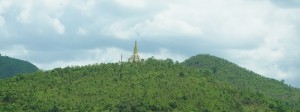By Rob Finlayson, originally published at Agroforestry World Blog

Ten Southeast Asian nations will form a single economic bloc at the end of 2015. Agroforestry, forestry and agricultural policies, implementation and law enforcement are lagging behind. The gap threatens millions of livelihoods, environmental safety and national abilities to adapt to climate change, despite some inspiring progress.
‘For ASEAN economic integration to work for the millions of citizens and national budgets reliant on agroforestry, forestry and agriculture’, said Delia Catacutan, ‘we need a change of mindset and behaviours as well as new, integrated policies, real implementation and enforcement. The risks of failing to provide for our people are real. And the consequences will be severe.’
Dr Catacutan was speaking on the sidelines of the 6th ASEAN Social Forestry Network Conference at Inle Lake, Shan State, Myanmar, 1–5 June 2015. As the country coordinator of the World Agroforestry Centre Viet Nam, with a wealth of experience throughout Southeast Asia and Africa, she is well placed to be sounding a warning.
At the end of 2015, the ten countries that make up the Association of Southeast Asian Nations (ASEAN) will form the ASEAN Economic Community (AEC), opening trade, investment and labour markets, supported by a new, integrated transport network through previously remote, forested areas that are home to millions of indigenous, poor, smallholding farmers.
While economic growth will likely follow, what’s not yet known is the impact on the 3.4 million hectares of treed and agricultural landscapes that represent the major sources of livelihoods for the majority of the region’s citizens and are the primary drivers of national economies. Experience from other parts of the globe suggest what’s likely to happen is more deforestation, large-scale commercial monoculture crops, extraction of natural resources, environmental degradation, income disparities, environmental degradation and a lack of resilience to climate change that will create a ‘perfect storm’ that threatens not only the region but the planet. Unless the nations work together, quickly, to address some glaring gaps.
Read full blog at Agroforestry World Blog











